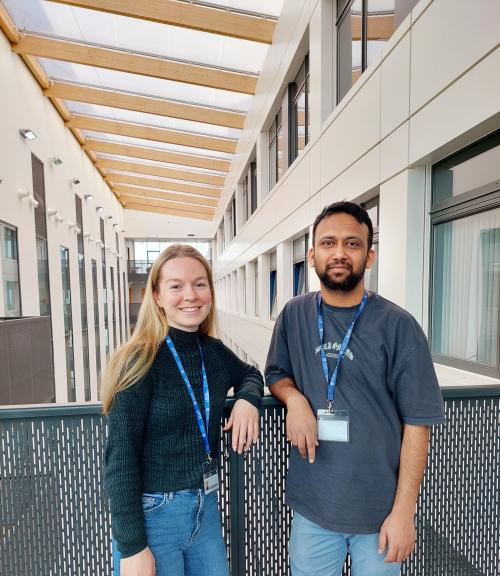
Protein phosphatase 2A (PP2A) is a highly abundant and essential Ser/Thr phosphatase that regulates a plethora of cellular processes. PP2A primarily operates as a holoenzyme complex, comprising one each of the scaffolding (A), regulatory (B) and catalytic (C) subunits. PPP2CA is the principal catalytic subunit of the PP2A holoenzyme complex.
Dysregulation of PP2A activity has been linked to a range of conditions, including diabetes, cancer and Alzheimer’s disease. While numerous studies have sought to understand the role of PP2A in human diseases by probing the extent of PP2A holoenzyme activity and defining the properties of putative PP2A substrates, the full scope of PP2A substrates in cells remains to be defined.
To address this, Abigail Brewer from the Sapkota Lab generated cells through genome editing in which she introduced a degron tag (dTAG) on PPP2CA. These cells allowed her to efficiently and selectively degrade PPP2CA using small molecule degraders called PROTACs (proteolysis-targeting chimeras) directed at the dTAG. Under conditions where PPP2CA was degraded, Gajanan Sathe, also from the Sapkota lab, undertook comprehensive total and phospho-proteomic analyses that revealed thousands of PPP2CA targets.
Commenting on the research, Gopal Sapkota said, “This is by far the most comprehensive atlas of PPP2CA substrates that anyone has identified. Our work should allow many investigators to interrogate whether some of the proteins they work on are also targets of PPP2CA and start to investigate the role of the phosphorylation events controlled by PPP2CA.” He also added, “we describe an elegant and robust method of uncovering potential substrates of phosphatases by targeted protein degradation, which will aid the understudied field of protein phosphatases immensely.”
This study, published in iScience was led by Sapkota lab PhD student Abigail Brewer and postdoctoral research fellow Gajanan Sathe. Honours project student Billie Pflug, Rosemary Clarke from the Flow Cytometry Facility and Thomas J. Macartney from the MRC PPU Reagents and Services also contributed to the work.
All mass spectrometry data acquired from this study can be accessed easily by following CurtainPTM links below. CurtainPTM platform was developed by Toan Phung and Raja Nirujogi in Dario Alessi’s group within the MRC PPU.
For phospho-proteomics: https://curtainptm.proteo.info/#/7bbd6bee-d15f-415a-8ffe-da9f8bb91873
For total proteomics: https://curtain.proteo.info/#/c16e75ef-879c-4e9a-9186-4bc4b5f28f0a

